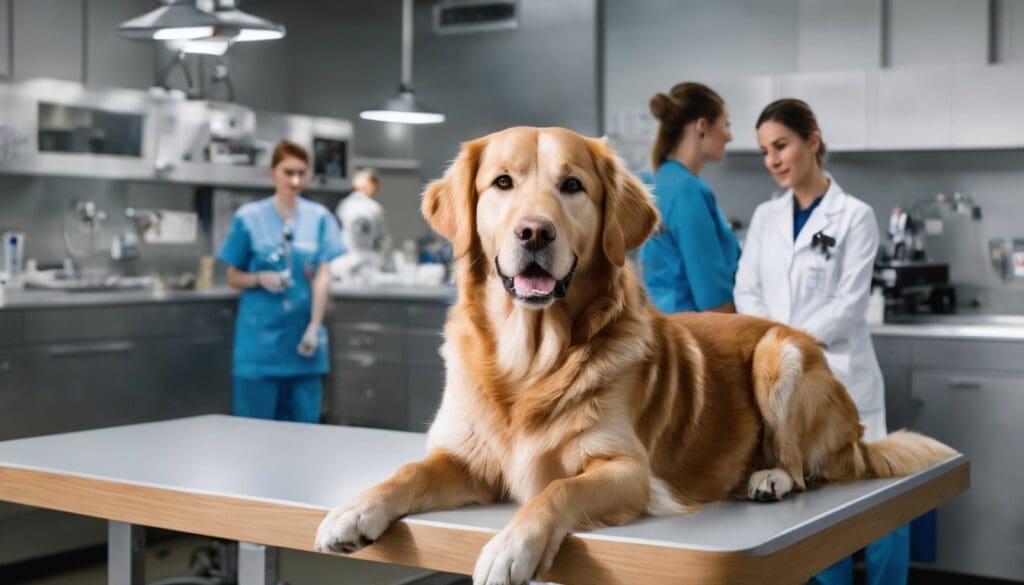Is your furry friend acting a bit off lately? It could be nothing, but sometimes small changes hint at bigger health issues. This article delves into why regular vet check-ups are crucial for your pet’s wellbeing, catching potential problems before they become serious.
Keep reading; it’s time to be proactive about their health!
Key Takeaways
- Early detection of health issues through routine veterinary check-ups can prevent serious diseases in pets and save owners from costly treatments.
- Regular vet visits allow professionals to assess the overall health of your pet, offer teeth cleaning, and provide vital recommendations for care that suit their specific needs.
- Vet check-ups are critical for keeping pets up-to-date with vaccinations, preventing infectious diseases, and ensuring they lead a healthy lifestyle through proper nutrition and exercise guidance.
- Veterinarians use regular exams to compare your pet’s health against normal benchmarks, catching any troubling changes early on which helps maintain long-term well-being.
- Engaging in Q&A sessions during vet appointments helps address concerns unique to each pet’s environment and supports environmentally conscious practices in pet care.
Why are Regular Veterinary Check-Ups Important?
Regular veterinary check-ups are vital for detecting problems early, preventing diseases, and assessing overall health. They can also save you money in the long run and provide an opportunity for Q&A sessions with your vet.
Detecting problems early on
Spotting health issues in pets before they spiral out of control is a crucial advantage of routine veterinary check-ups. Early detection means veterinarians can nip potential ailments in the bud, often with less invasive treatments.
This proactive approach to pet wellness keeps your furry friends healthier for longer and supports their wellbeing.
Veterinary care isn’t just about dealing with sickness; it’s an essential part of preventive medicine. Regular exams allow vets to monitor changes over time, catching subtle signs that might signal the onset of disease or discomfort.
Keen observation and timely intervention are key to maintaining animal welfare and ensuring our companions lead full, vibrant lives without hidden ailments lurking beneath the surface.
Preventing diseases
Regular veterinary check-ups play a vital role in preventing diseases in pets. These check-ups enable veterinarians to identify potential health issues early on, allowing for prompt intervention to prevent the development of serious conditions.
By administering routine vaccinations and recommending preventative treatments based on the pet’s lifestyle, veterinarians can significantly reduce the risk of infectious diseases.
Additionally, they provide valuable guidance on nutrition and exercise, contributing to overall pet wellness.
Assessing overall health
During a routine veterinary check-up, the veterinarian will assess your pet’s overall health. This involves checking vital signs such as temperature, heart rate, and breathing to ensure they are within normal ranges.
Additionally, the vet may examine eyes, ears, teeth, skin condition, weight management and mobility to detect any abnormalities. They may also recommend blood tests or other diagnostic procedures to gain further insights into your pet’s internal health.
In conclusion of this examination process and in line with preventive care strategies for maintaining animal health through regular check-ups across veterinary care services provide valuable advice on wellness exams which ensures pets’ preventative medicine needs are met while keeping a close monitor on their general well-being that encompasses ongoing disease prevention of any potential future animal diseases.
Saving money
Regular veterinary check-ups play a crucial role in saving money on healthcare costs for pets. Early detection of health issues can help prevent expensive treatments or surgeries later on.
By identifying and addressing potential problems early, pet owners can avoid costly medical bills, making regular check-ups a wise investment in the long run.
Preventative care through routine exams is a cost-effective approach that ensures pets stay healthy while avoiding unnecessary expenses related to treating advanced illnesses. Regular visits to the vet for preventive measures such as vaccinations, parasite control, and dental care contribute to maintaining overall pet health and minimising financial burdens associated with extensive medical interventions down the line.
Q&A sessions
During Q&A sessions, you can ask about specific environmental concerns related to your pet’s care. Discuss ways to reduce the environmental impact of pet ownership and seek recommendations for eco-friendly pet products and practices from your veterinarian.
Gather information on sustainable pet diets, reducing waste, and supporting environmentally conscious veterinary practices.
Understanding how your pet’s care contributes to environmental issues is essential for environmentally conscious individuals. Engaging in conversations with veterinarians during Q&A sessions can provide valuable insights into how best to support conservation efforts through responsible pet ownership without sacrificing the health and well-being of your beloved companions.
The Role of Veterinarians in Preventive Care
Veterinarians play a crucial role in preventing diseases and maintaining the overall health of pets. Their expertise in detecting potential issues through physical exams is invaluable in keeping our furry friends healthy and happy.
Expertise in detecting and preventing diseases
Veterinarians possess expertise in detecting and preventing diseases, ensuring the well-being of your beloved pets. Through their knowledge and experience, they can identify early warning signs and recommend effective preventive measures to safeguard your pet’s health.
These dedicated professionals play a crucial role in monitoring and addressing potential health issues before they escalate, ultimately contributing to the overall safety and longevity of your pet.
Utilising their expertise in detecting and preventing diseases, veterinarians work proactively to ensure that pets remain healthy through regular check-ups. By identifying potential risks early on, they enable environmentally conscious individuals to take actionable steps towards maintaining the health of their pets while supporting conservation efforts through responsible pet care practices.
Importance of physical exams
Expertise in detecting and preventing diseases seamlessly transitions into the critical importance of physical exams. These routine check-ups play a pivotal role in safeguarding your pet’s health, allowing veterinarians to identify potential issues before they escalate.
Through thorough examinations, vets can pinpoint abnormalities and develop suitable interventions for their early management.
During physical exams, veterinarians assess your pet’s vital signs, body condition, skin and coat health, dental hygiene, joint mobility, and more. Such evaluations are instrumental in identifying underlying conditions that may not display overt symptoms.
Benefits of Wellness Check-Ups for Pets
Early detection and treatment of diseases can help in avoiding more serious health issues for your pets. Regular check-ups also allow for the prevention of future health problems through proactive measures taken by veterinarians.
Early detection and treatment of diseases
Regular veterinary check-ups play a crucial role in the early detection and treatment of diseases in pets. These check-ups enable veterinarians to identify any potential health issues at an early stage, allowing for prompt intervention and treatment.
By identifying health problems early, pet owners can avoid more severe complications and costly treatments, ultimately ensuring the wellbeing of their beloved companions.
During routine veterinary check-ups, veterinarians conduct thorough physical exams and may recommend additional diagnostic tests if necessary. This proactive approach not only helps in treating current ailments but also contributes to preventing future health issues, thus promoting the overall health and longevity of pets.
Prevention of future health issues
Preventing future health issues in pets begins with regular veterinary check-ups. These visits enable early detection and treatment of potential problems, reducing the risk of more serious illnesses developing.
By staying proactive and keeping up with preventive care, pet owners can help maintain their furry friends’ long-term health and well-being.
Considering the significance of prevention for a pet’s overall wellness, it is essential to understand how these routine visits contribute to their ongoing health maintenance. Therefore, let’s delve into the benefits of wellness check-ups for pets.
Comparison to normal health rates
Regular veterinary check-ups allow pet owners to understand how their pet’s health compares to normal health benchmarks. Such comparisons are vital in spotting deviations that could indicate underlying health issues.
| Health Aspect | Normal Range | Notes for Pet Owners |
|---|---|---|
| Weight | Varies by breed and age | Identifies under/overweight issues |
| Heart Rate | Dependent on size (Small dogs: 90-140 bpm, Large dogs: 60-100 bpm) | Irregularities may indicate heart problems |
| Respiratory Rate | Approx. 10-30 breaths per minute | Abnormal rates could suggest respiratory issues |
| Temperature | Approx. 38.3-39.2°C | Consistent high/low readings require attention |
| Teeth and Gums | Pink gums, no excess tartar | Gum disease can lead to other health complications |
| Coat Condition | Shiny and smooth, without excess shedding or bald patches | Changes can indicate nutritional deficiencies or other health issues |
| Behaviour | Active, responsive, consistent appetite | Shifts in behaviour can be early signs of distress or illness |
Veterinary check-ups provide opportunities to benchmark pets’ health against these standards, facilitating early interventions and promoting long-term well-being.
What to Expect During a Routine Veterinary Check-Up
During a routine veterinary check-up, you can expect your pet’s teeth to be cleaned, their overall health to be assessed, and recommendations for their care to be provided. These regular check-ups are essential for maintaining the well-being of your beloved pet.
Teeth cleaning
During a routine veterinary check-up, teeth cleaning is an essential aspect of maintaining your pet’s overall health. The veterinary surgeon will carefully examine the condition of your pet’s teeth and gums, removing any plaque or tartar buildup to prevent dental diseases.
This proactive measure not only ensures good oral hygiene but also contributes to your pet’s overall well-being. By addressing dental care during check-ups, you are actively promoting preventative care and supporting your pet’s long-term health.
Regular veterinary check-ups provide an opportunity for comprehensive assessment of your pet’s teeth, ensuring that any potential issues are identified early on before they escalate into more serious problems.
Assessment of overall health
During a routine veterinary check-up, the assessment of overall health plays a vital role in ensuring your pet’s well-being. Veterinarians will conduct thorough physical examinations to evaluate your pet’s weight, skin condition, and muscle tone, as well as check for any signs of pain or discomfort.
They may also assess your pet’s heart rate, respiratory rate, and temperature to gauge their general health status.
Additionally, blood tests and other diagnostic procedures may be recommended to detect underlying health issues that are not immediately visible during the physical examination. The assessment of overall health allows veterinarians to identify potential problems early on and provide necessary care or interventions to prevent future complications.
Recommendations for pet care
After assessing your pet’s overall health, the vet will provide recommendations for pet care. These may include dietary adjustments, exercise routines, or preventive medications to ensure your pet’s continued well-being.
Following these recommendations can help maintain your pet’s health and prevent future issues from arising.
Regular veterinary check-ups emphasise the significance of adopting a sustainable approach to pet care. By implementing the recommended changes and following through with regular check-ups, you actively contribute to preserving the environment by reducing the likelihood of medical waste related to avoidable treatments and promoting a healthier lifestyle for your pet in an environmentally conscious manner.
Conclusion
In summary, regular veterinary check-ups play a crucial role in keeping our pets healthy and happy. Detecting potential issues early can lead to effective treatment and save money in the long run.
By working closely with veterinarians, pet owners can ensure that their furry friends receive the best preventive care possible. Making regular check-ups a priority is key to maintaining the well-being of our beloved pets.
Taking this proactive approach will contribute to their overall quality of life.
FAQs
1. Why are regular veterinary check-ups important for my pet?
Regular veterinary check-ups are crucial for monitoring your pet’s health, ensuring they stay safe and receive the right care based on veterinary recommendations.
2. How often should I take my pet for checkups?
Veterinary professionals suggest scheduling regular checkups at least once a year to keep track of your pet’s well-being and prevent potential health issues.
3. What happens during a veterinary check-up?
During a routine visit, veterinarians perform health monitoring procedures that assess your pet’s overall condition, give vaccinations if needed, and offer advice on keeping them healthy.
4. Can regular vet visits help in preventing diseases in pets?
Yes, attending regular vet appointments can lead to early detection of diseases which is key for effective treatment and maintaining your pet’s safety and good health.





